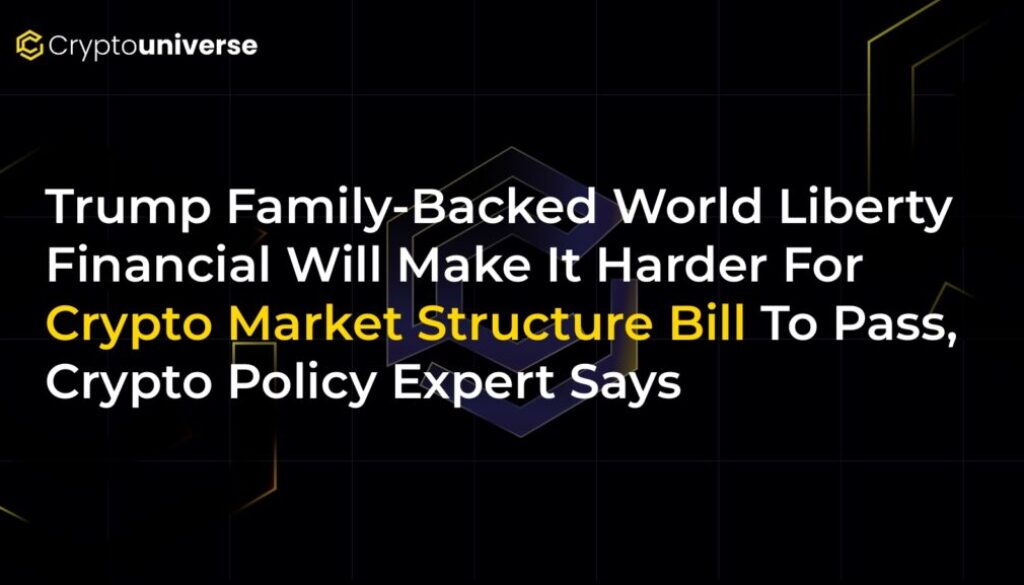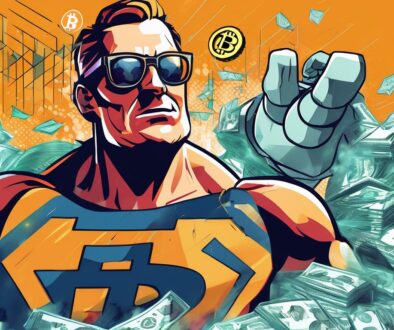Trump Family-Backed World Liberty Financial Will Make It Harder For Crypto Market Structure Bill To Pass, Crypto Policy Expert Says

The High-Stakes Intersection of Politics and Crypto Regulation
The path to clear cryptocurrency regulation in the United States has always been complex, fraught with political division and technical debate. Now, a new and highly controversial project backed by the Trump family, World Liberty Financial (WLFI), is threatening to derail the entire process. According to a prominent crypto policy expert, the project’s launch and the massive paper wealth it has generated could be the final nail in the coffin for bipartisan crypto legislation this year.
Jake Chervinsky, a board member of the Blockchain Association and legal chief at Variant, recently warned that the Trump-affiliated project makes the political landscape for crypto advocates significantly more challenging. “World Liberty Financial will make it way harder to get market structure legislation done in the Senate,” Chervinsky stated, highlighting the difficulty of securing the necessary Democratic votes. For these senators, a pro-crypto vote is now entangled with a politically toxic asset, making it “politically challenging (to put it mildly).”
What is World Liberty Financial (WLFI)?
World Liberty Financial is a decentralized finance (DeFi) initiative with deep ties to Donald Trump and his family. The project recently launched its governance token, WLFI, which began trading on major exchanges like Binance and Coinbase. The debut was explosive, boosting the Trump family’s on-paper net worth by an estimated $5 billion.
This staggering figure has made WLFI the family’s single most valuable asset, reportedly doubling the value of their extensive real estate empire. While these holdings are currently locked and cashing them out presents its own set of challenges, the optics of such a massive, sudden wealth increase from a crypto project have ignited a political firestorm.
Ammunition for Crypto’s Biggest Opponents
The controversy surrounding WLFI has provided powerful ammunition to crypto-skeptics in Washington, most notably Senator Elizabeth Warren (D-MA). A long-time critic of the industry, Senator Warren has been a major roadblock to regulatory progress. Even before the WLFI launch, she voiced opposition to market structure legislation, claiming it was “written by the crypto industry that supercharges this kind of corruption.”
Reacting to the news of the Trump family’s $5 billion paper gain from WLFI, her response was swift and blunt: “It’s corruption, plain and simple.”
This sentiment strengthens her argument and makes it increasingly difficult for moderate Democrats to side with their Republican colleagues on the issue. The Trump family’s deep involvement in WLFI allows opponents to frame any pro-crypto legislation not as a move for financial innovation, but as a bill that enables self-enrichment and potential corruption by political figures.
Red Flags from the Crypto Community
It isn’t just politicians who are raising alarms. Within the crypto community itself, World Liberty Financial has been met with significant skepticism and criticism. Concerns frequently cited on social media include:
- Insider Control: Reports suggest that around 56% of the token supply is held by the Trump family, founders, and other insiders, raising fears of a centralized project where insiders could dump tokens on retail investors.
- Centralization and Censorship: In a move seen as hypocritical for a project named “Liberty Financial,” the WLFI team reportedly blacklisted the wallet of TRON founder Justin Sun after he acquired a large sum of tokens. This action undermines the core crypto principles of decentralization and censorship resistance.
- Accusations of a “Scam”: Many prominent voices in the crypto space have labeled the project’s structure as predatory, designed primarily to extract money rather than build a sustainable, decentralized ecosystem.
What’s at Stake: The Crypto Market Structure Bill
The timing of this controversy could not be worse for the industry. Lawmakers have been working on crucial legislation, such as the Responsible Financial Innovation Act, to provide much-needed regulatory clarity. This bill aims to define the roles of the Securities and Exchange Commission (SEC) and the Commodity Futures Trading Commission (CFTC) in overseeing digital assets, a critical step for the industry’s growth and stability in the U.S.
Republican leaders like Senator Tim Scott (R-SC) and Senator Cynthia Lummis (R-WY) had expressed optimism about passing the bill by the end of the year, with Scott predicting that 12 to 18 Democrats might vote in favor. However, the political fallout from WLFI directly aids Senator Warren’s efforts to rally opposition, making that prediction seem increasingly unlikely.
A More Complicated Path Forward
The launch of World Liberty Financial has inadvertently placed the entire U.S. crypto industry in a political crossfire. What was once a debate about financial innovation and regulatory frameworks is now intertwined with accusations of corruption and political conflicts of interest. As lawmakers in the Senate weigh their options, the shadow of WLFI looms large, making it harder than ever for the


